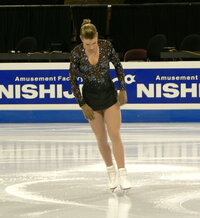Separating this out for its own thread:
The struggle and pressure put on "pairs girls" to weigh less affected Jessica and she retired due to her struggles with bulimia
affected Jessica and she retired due to her struggles with bulimia
essica Dubé suffered from bulimia at the end of her career
(articles in French, very informal translation of parts mine)
She made herself vomit before competitions, because she wanted to be thin and light.
....
For a long time, the Olympic athlete was ashamed to talk about her bulimia. When she was asked why she quit skating, she said that she was injured
....
They told her that it would be easier for her partner to lift her if she was lighter. She was small and not overweight. However, they weighed her regularly.
(there is a lot more to this article and the next. Very troubling
 )
)
The struggle and pressure put on "pairs girls" to weigh less
 affected Jessica and she retired due to her struggles with bulimia
affected Jessica and she retired due to her struggles with bulimiaessica Dubé suffered from bulimia at the end of her career
(articles in French, very informal translation of parts mine)
She made herself vomit before competitions, because she wanted to be thin and light.
....
For a long time, the Olympic athlete was ashamed to talk about her bulimia. When she was asked why she quit skating, she said that she was injured
....
They told her that it would be easier for her partner to lift her if she was lighter. She was small and not overweight. However, they weighed her regularly.
(there is a lot more to this article and the next. Very troubling






 I put it in the spoiler section to be consistent with the previous post, but hope you don't mind if I discuss it here. Eating disorders can be a very private struggle, as many suffers would go to great length to hide their eating, purging, over-exercising etc. from others' observation, which makes it difficult to notice until the physical toll is no longer negligible. It also adds to the hurdles for the sufferers to open up, as there is an inherent shame in admitting you have been doing things in secret (even though it's not their fault). What's more they often might not realize what they're going through is a disorder instead of something about their ability to exert self-control. It makes me think it might be advisable to include in training programs a wellness module to educate the athletes on how to establish a healthy relationship with your body and what are some signs that you or others might be suffering from ED. It can even be something in the coaching exams. Well, at least I can dream.
I put it in the spoiler section to be consistent with the previous post, but hope you don't mind if I discuss it here. Eating disorders can be a very private struggle, as many suffers would go to great length to hide their eating, purging, over-exercising etc. from others' observation, which makes it difficult to notice until the physical toll is no longer negligible. It also adds to the hurdles for the sufferers to open up, as there is an inherent shame in admitting you have been doing things in secret (even though it's not their fault). What's more they often might not realize what they're going through is a disorder instead of something about their ability to exert self-control. It makes me think it might be advisable to include in training programs a wellness module to educate the athletes on how to establish a healthy relationship with your body and what are some signs that you or others might be suffering from ED. It can even be something in the coaching exams. Well, at least I can dream.
